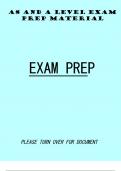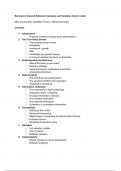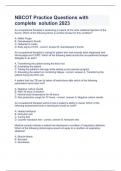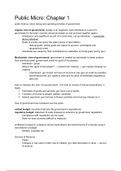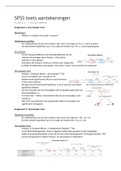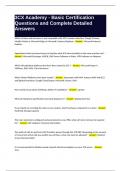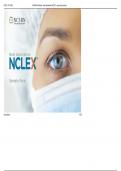Lecture 1: Introduction
Politics of difference: how power and political institutions categorize people into groups
and how this generates inequality systematically
Which differences are political?
- Depends on what normal is, never has to be justified
- Difference is protected in private sphere
- Public sphere should be neutral (often close to dominant form) and
non-discriminating
Is it possible to define neutrality?
- Positionality matters
- Describing difference is political, but not all differences are political
- Interested in how and why some become and remain political
- Defining what is “normal” and what is “different” is political
- Critical theorists question possibility of a neutral public space
- Political scientists study differences between interests and identities
Lecture 2: The Public Sphere
Public sphere: a communicative realm to discuss and debate common interests of
government where “force of better argument” (rational) wins and coercion is absent
- Participants leave their status and identities behind
- Physical sites where the public is brought into discussion, communication does
not have to be live and can be mediated
- Public sphere has grown from serving the wealthy to including more
classes, workers, and women
- Who has a voice is continually contested
- Groups unable to participate in decisions made in the public sphere; who is
part of “the common”?
- Realm exists where we can make decisions without force, moral
argument is shown through nonviolence
, Veil of ignorance: hypothetical state in which decisions about social justice and the
allocation of resources would be made fairly, as if by a person who must decide on
society’s rules and economic structures without knowing what position they will occupy
in that society
How can we make fair rules?
- All theory is for someone and some purpose
- Positionally matters in how we view ideas as legitimate, such as method,
gender, race/ethnicity, nationality/class, language
- Ways of asking questions is perspective
- All knowledge is influenced by who we are, knowledge is relative
- Academia is a particular type of public sphere
Bennet & Livingston:
- Capture and erosion of liberal governing institutions by wealthy interests and
aligned political elites who are unable to sell their actual agendas to the public
without increasing levels of disinformation
- Creating mistruths increased rapidly; with disinformation, the ability to
come to agreements is abysmal
- Three arguments about disinformation:
1. Confirmation bias: set of assumptions/convictions
- Leads us to discount validity of conflicting ideas and search for ideas
to conform
2. Erosion of liberal institutions: lack of trust in leaders, declining faith in
institutions to distinguish fact and put forward arguments for the common
interest
3. State interference
- Result of decades of corrosive political and economic pressure that has eroded
public confidence in institutions and citizens in search of emotionally affirming
facts (confirmation bias)
Young:
- When we conceive of the public sphere as neutral, we have certain assumptions
- Practical speech devalued in public sphere
- Emphasis on particular framework of logic, downplaying arguments that are
maybe more powerful but don’t follow a logical sequence

